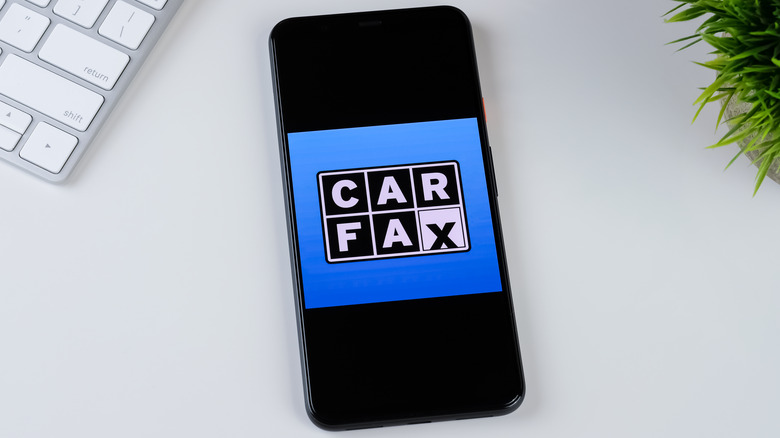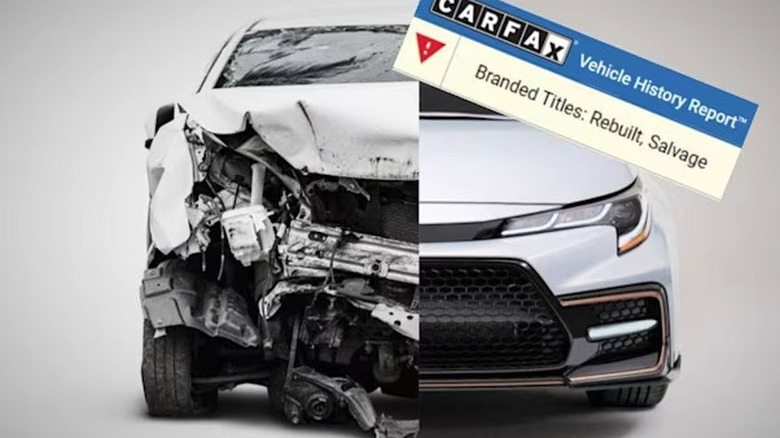Can You Trust A Carfax Report When Buying A Used Car? Here's What Users Say
Buying a used car is a lot more complicated than buying a new one for a simple reason: you have no idea how the previous owner treated it. That's why most of us put on our detective caps once we've identified a used car we might want to buy. For many prospective used car buyers, that includes obtaining a Carfax report to help them put together the puzzle pieces of the vehicle's past, including accidents, service records, and lemon history — all things that can help them make an informed decision about whether to purchase the car or not.
This information is so important that the Federal Trade Commission recommends that, in addition to checking the National Motor Vehicle Title Information System and vehiclehistory.gov for information on a vehicle's history, consumers also obtain a vehicle history report from Carfax or a similar service before buying a used car. There are certain red flags in a Carfax report that can't be ignored, such as a suspicious maintenance history and discrepancies in odometer readings. However, as helpful as a Carfax report can be, many used car buyers have lingering questions about their accuracy and whether they can be trusted.
And that's a valid concern because Carfax reports are only as accurate as the data reported to it (and it doesn't receive information in real time), meaning not every accident, repair, or issue with a car makes it into the system. Given all of this, as one might imagine, Carfax users have a lot to say about how trustworthy these reports are when it comes time to purchase a used car.
Users like Carfax's convenience but warn it shouldn't be the only tool you use
The bad news is that used cars aren't getting any cheaper, the good news is that researching the history of the vehicle you're thinking about purchasing can help ensure you don't drive away with a lemon. One of the easiest ways to do that is by paying $44.99 for a Carfax report. Judging by the comments on different forums, most used car buyers agree that a Carfax report is helpful for gaining insight into a vehicle's history, such as ownership changes and mileage logs. However, they almost uniformly advise against using Carfax as your sole source for a vehicle's history.
On the r/Cars subreddit, a Redditor questioned the credibility of Carfax reports after trading in their vehicle and noticing that the full transmission replacement on their Subaru Outback wasn't listed in the Carfax report, which only showed a routine tire pressure check. The consensus in the subreddit was that Carfax reports are a helpful tool but limited and should only be used to rule out a car, for example, if the report shows it was in a major accident. Carfax users need to understand that its reports don't prove a car is in good condition and should treat them as a starting point for further investigation.
Used car buyers shared this sentiment on the CarTalk forum, with one pointing out that, "Not all shops provide information to CarFax. It's worth looking at, but I wouldn't depend on it for a decision." The bottom line is, you'll want to review a Carfax report before buying a used car, but you should do due diligence beyond that by paying for a pre-purchase inspection and cross-checking the vehicle history with other sources.
Users report inaccuracies and missing information in Carfax reports
While there are a few used cars no new driver should ever buy, there are many more that are worth considering. Still, you want to be sure you have as much information about the car's history as possible to ensure the vehicle doesn't have any hidden issues, and Carfax reports are often advertised as a way to help consumers do just that. However, issues arise when these reports miss key details.
You may think the worst thing that can come from a Carfax report is a missed detail before you purchase the vehicle. However, the experience of a user on the Leasehackr forum shows that's not the only downside to these reports. When this user went to sell their 2007 Lexus GS 450h, which they had bought used, the Carfax report suddenly showed rear-end and structural frame damage from 2009. This information wasn't present in the report when they bought the car four years earlier. Instead, it was added in 2018. As the user put it, they ended up overpaying when they bought the car and losing money again when trying to sell, all thanks to the delayed and questionable report update.
Over on 4C Forums, a user described Carfax reports as "shockingly unreliable" and went on to say that, "I haven't heard of accident descriptions being messed with, but accidents can appear months to years later, so a clean Carfax doesn't give as much comfort as it should..." Across forums, delayed reporting and reports with inaccurate and missing information were a common theme. When all is said and done, Carfax reports can be a helpful tool, but they're not foolproof.


